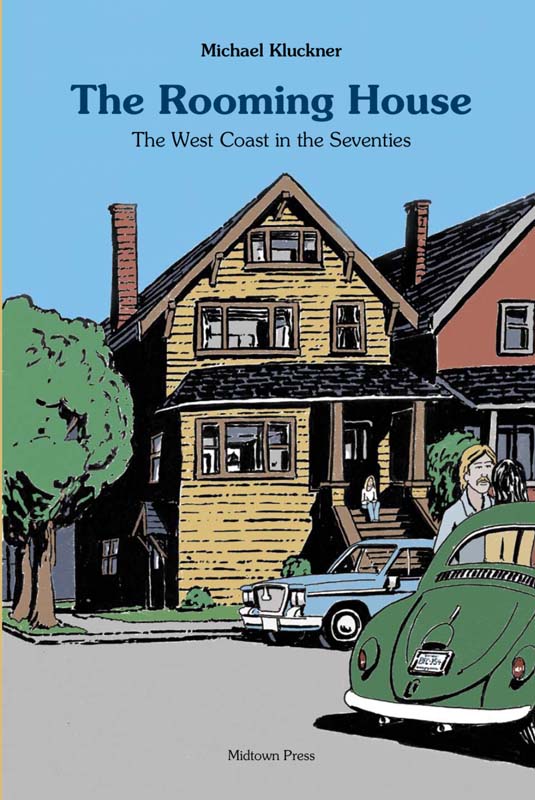
Contact me Go to home page
The Rooming House
*
Michael Kluckner
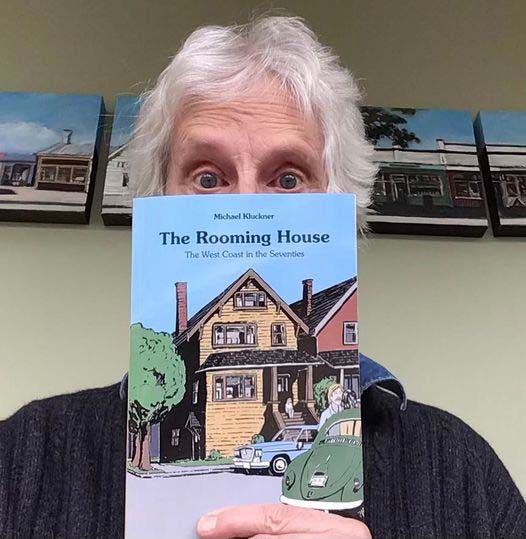
| In the 1960s and early '70s, thousands of youths were on the
road, hitchhiking across Canada and the USA and travelling through
Europe, living in rooming houses in cities like Vancouver and in
communes in the country. Their individual stories played out on a
canvas stretched across the frame of world events including
Vietnam, Woodstock, Watergate, and the emerging environmental
movement, often in a climate of idealism, protest and anger. This book follows several of these young men and women sharing an old home in Vancouver's Kitsilano district, tracking their loves, losses and wanderings through the diary entries of two of them. It is both a coming-of-age novel and an exploration of the events of those years, complete with a downloadable soundtrack of rock classics and notes for readers who weren't around then. |
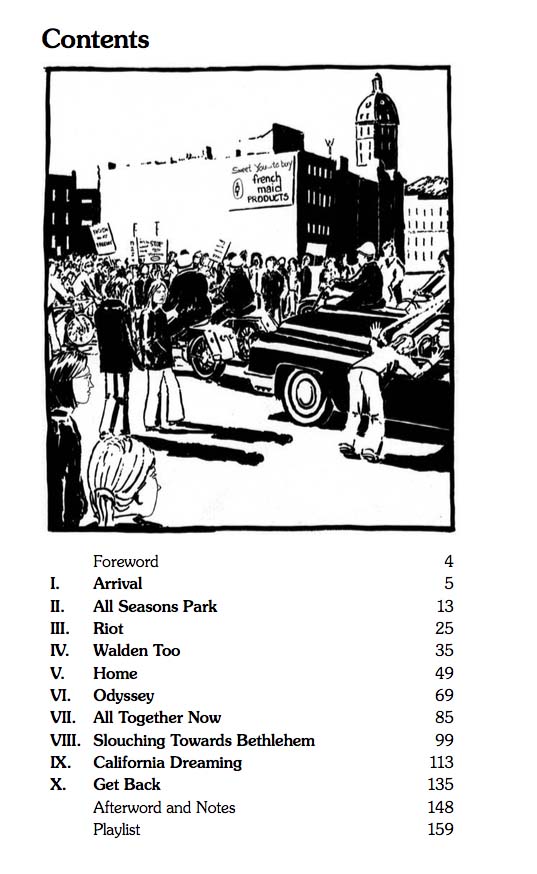
|
Where to Buy It?
1) Preferably, your independent bookstore. In Vancouver, go to: • Massy Books, 229 East Georgia, 604-721-4405 • Iron Dog Books, 2671 East Hastings Street, 604-215-8807 • Hager Books, 2176 West 41st, 604-263-9412 • Book Warehouse Main Street, 4118 Main Street, 604-879-7737 ...but Chapters/Indigo stores have it too. 2) In Canada, you can order a signed copy from me using your bank's e-payment system (Interac). Click on this link for how to do it (this is not a bank or credit card link). |
Named one of the "Top 20" books published in British Columbia in 2022.
Sales at "non-bookstore" outlets like BC Ferries:
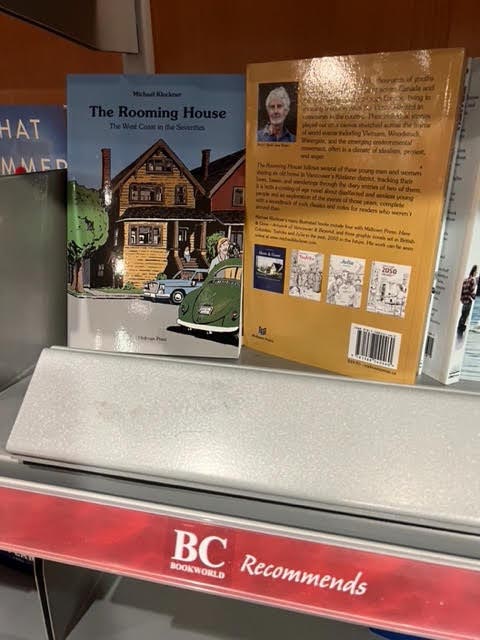
Write-up in the Winter 2022 issue of BC Bookworld:
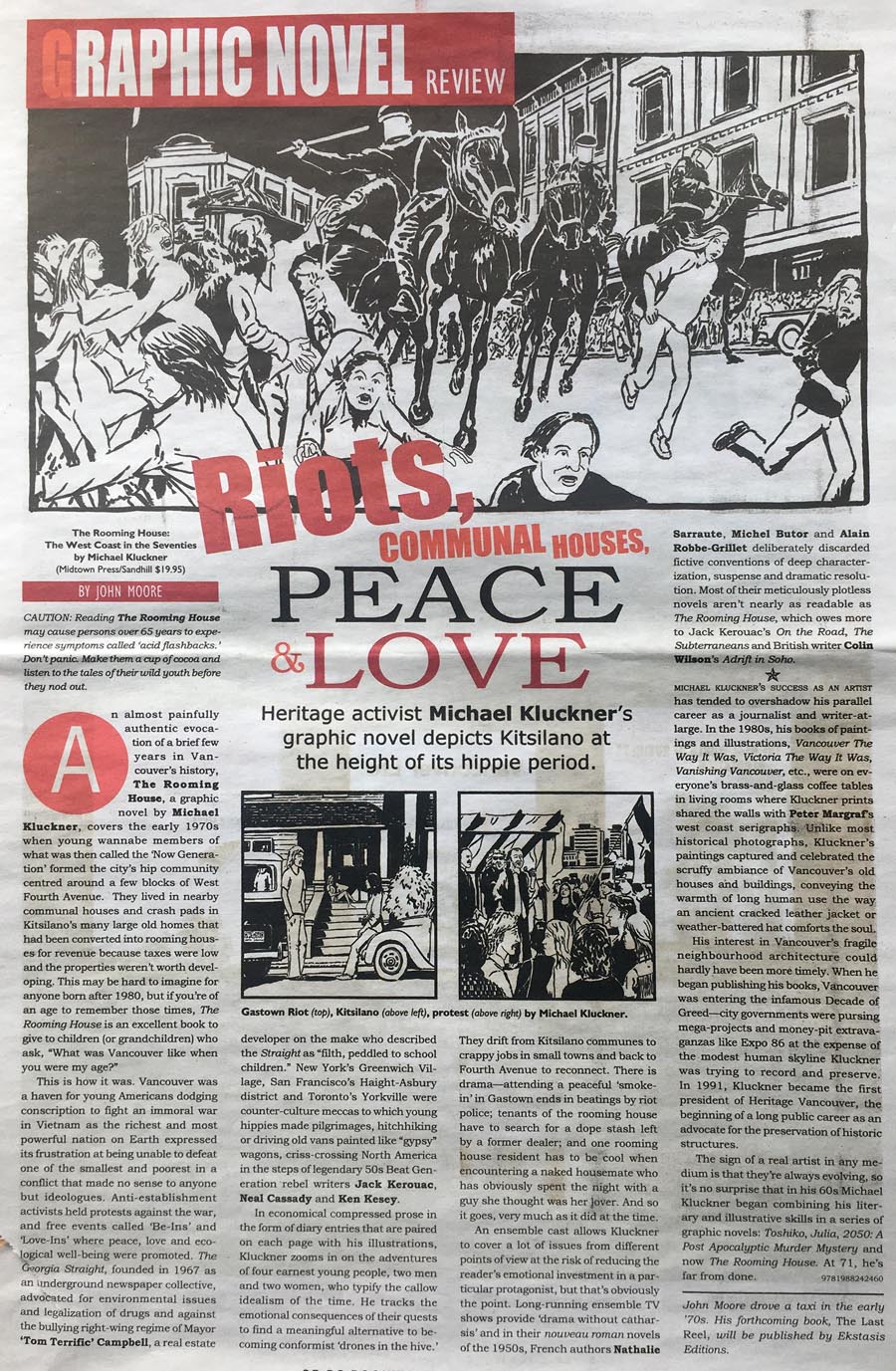
In June and July, 2022, we kept bouncing back and forth between #7 and #9 on the BC Book Bestseller List,
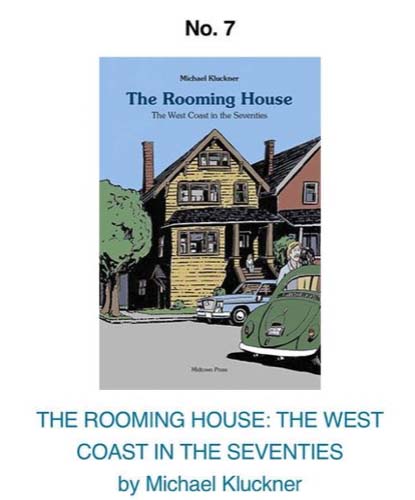
***
John Ackerman of CityNews 1130 named it as one of the 20 best books of 2022, following this review.
Click on the graphic to read the whole thing.
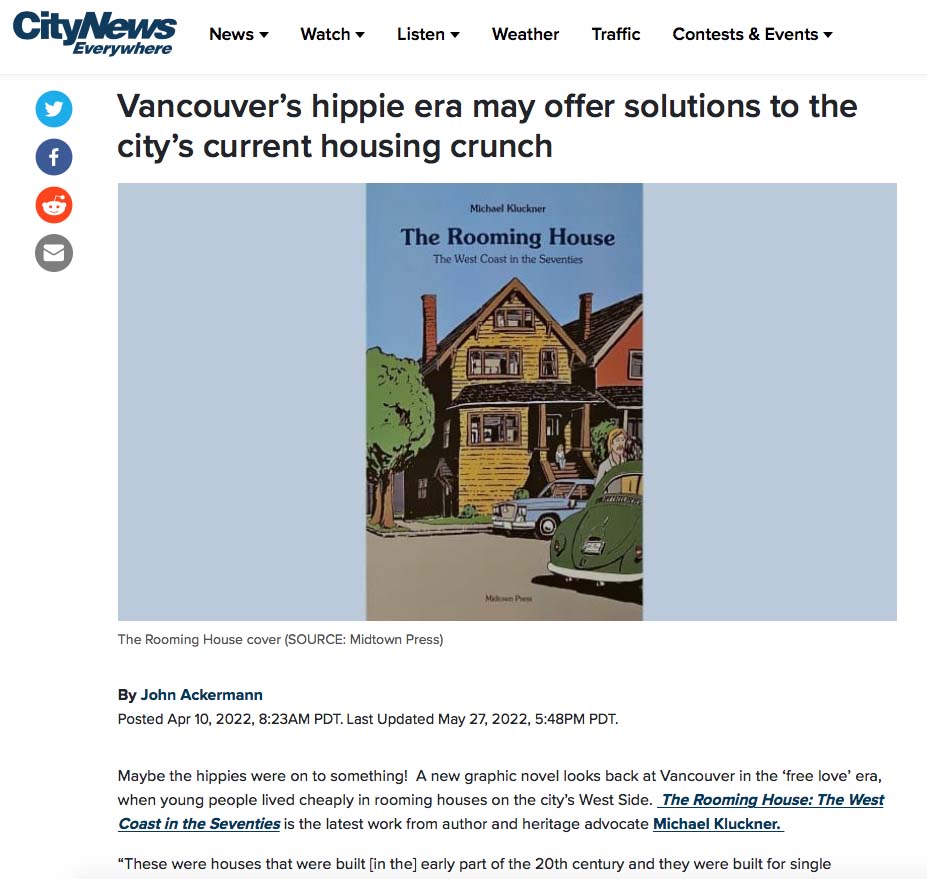
Review by Valerie Green in the British Columbia Review
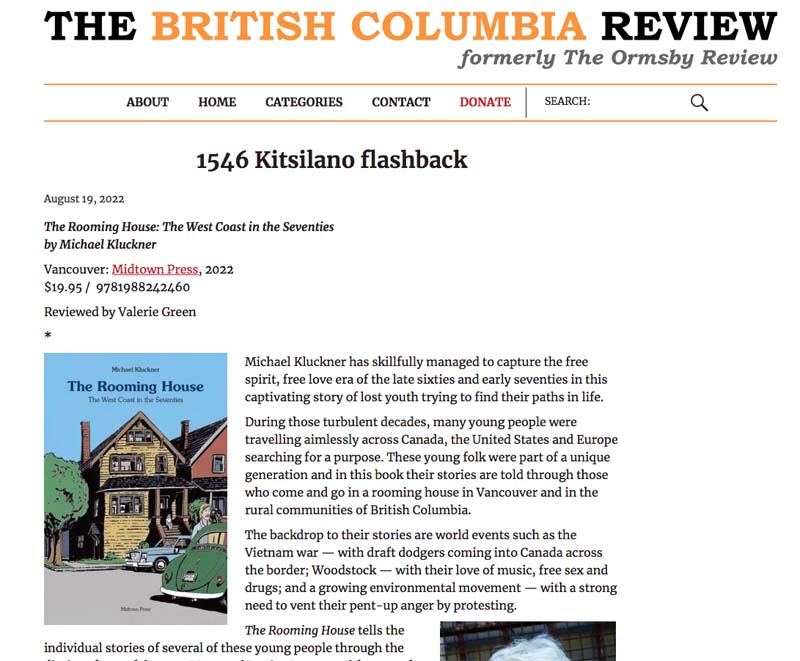
and...
The True North Country Comics podcast with John Swiminer. Click to go to the YouTube site:
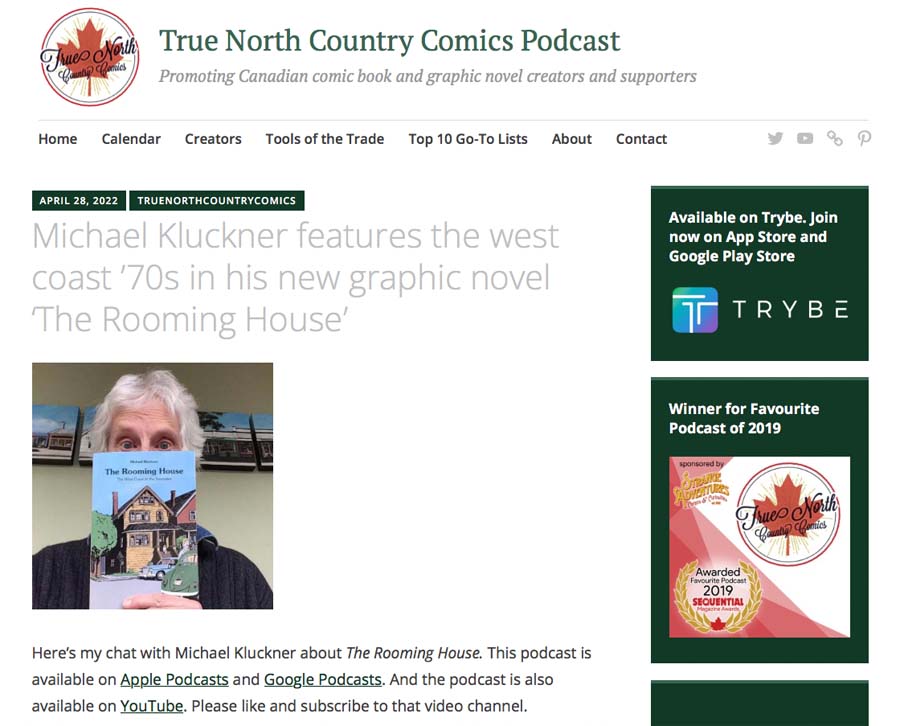
***

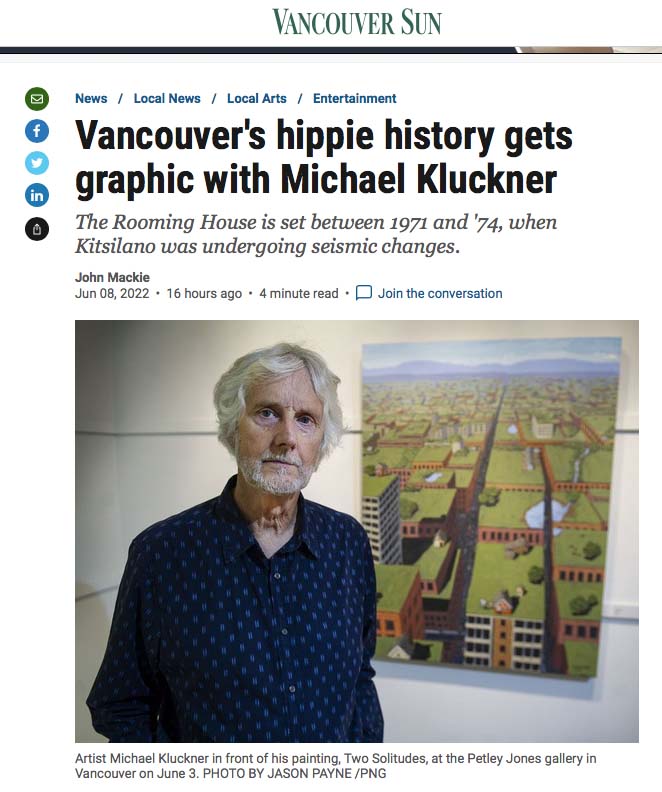
| By John Mackie One of the staples of the hippie lifestyle was a bunch of longhairs renting a house together, where they went through all sorts of life changes. Michael Kluckner was one of them. At one point he even scrounged together the money to buy a big, old house in Kits, which he turned into a big, old rooming house for his friends. The experience inspired his latest graphic novel, The Rooming House (Midtown Press). Told through the diaries of a man and a woman who live in the same house, it can be read as both fiction and history, which was Kluckner’s goal. “It’s a coming-of-age (story), falling in love, on the one level,” said Kluckner, an artist, writer and heritage activist who has released several acclaimed books. “Then I hope people will go back and read it as non-fiction.” It will probably spark nostalgia in readers of a certain vintage, and may surprise younger ones, as the housemates surf through the counterculture — pot, sex, politics, escaping to the Kootenays, California and India — between 1971 and ‘74. The novel touches on several major events in Vancouver’s hippie era, such as the hippie occupation of a proposed waterfront development that became known as All Seasons Park. Then there’s the Gastown Riot, an infamous pot “smoke-in” where mounted police dragooned hippies. One of the characters in the book is a riot organizer and an editor at the local underground paper the Georgia Straight — a thinly veiled portrait of Ken Lester, who died last year. But it wasn’t Lester’s death that inspired the book. Kluckner came up with the concept on a camper van trip with his wife in the Australian Outback in 2009. “Every night we’d pull into some little place, check email and be in touch with people all over the world. Doesn’t matter where they are,” he said. “And I thought, ‘How different is that?’ In the 1970s, somebody would come into your life, you’d fall in love with them and they’d slip away and you’d never see them again. And you had no way of getting in touch with anybody. “People were hitchhiking around and passing like ships in the night. That’s what fundamentally is so completely different from our time with then.” Still, he believes there are similarities between the problems his generation faced and today’s millennials. “Climate change — we thought we were up against it too,” he said. “Up against population explosion and all those issues — we were too. Antiwar sentiment, particularly anti-nuclear, (was) very much a part of the 1970s, and really a part of it now, we’re watching a war in Ukraine as we watched the war in Vietnam.” The 71-year-old Kluckner has an art show at the Petley Jones Gallery (2245 Granville St.) where several panels from the graphic novel are for sale through June 16, along with some recent oil paintings. One of the paintings features contrasting worlds: bucolic farm scenes set on the top of highrise towers. “The two solitudes of modern life,” he explained. “You’ve got the rural and the urban, and they don’t speak to each other, they’re not aware of each other at all. The countryside and the city are so separate that the water doesn’t even flow off (one of the farms on top of a highrise) down into the city. That was me being Rene Magritte, effectively.” Highrise towers are very much in the news today, thanks to the controversy generated by the city’s proposed Broadway plan, which looks to add 50,000 residents to a 500-block area over the next three decades. Kluckner likens it to the kind of megaprojects that Vancouver rejected in the 1960s and ’70s. “With the extreme arrogance of architects and planners, they’re saying, ‘We can build a city. We can just do it, because we know what we’re doing,’ ” he said. “As opposed to a city being this thing that evolves slowly, and individuals could put their little bit of say in. (Where) some old things remain and some new things are built, and it evolves in an incremental way. “Now it’s like, ‘No, no, we’re just going to clearcut the thing. We can build it new, but because we’re so smart, we’re going to really build a community and it’s going to be sustainable and all this and that.’ ” He sighs. “That’s super-annoying.” |
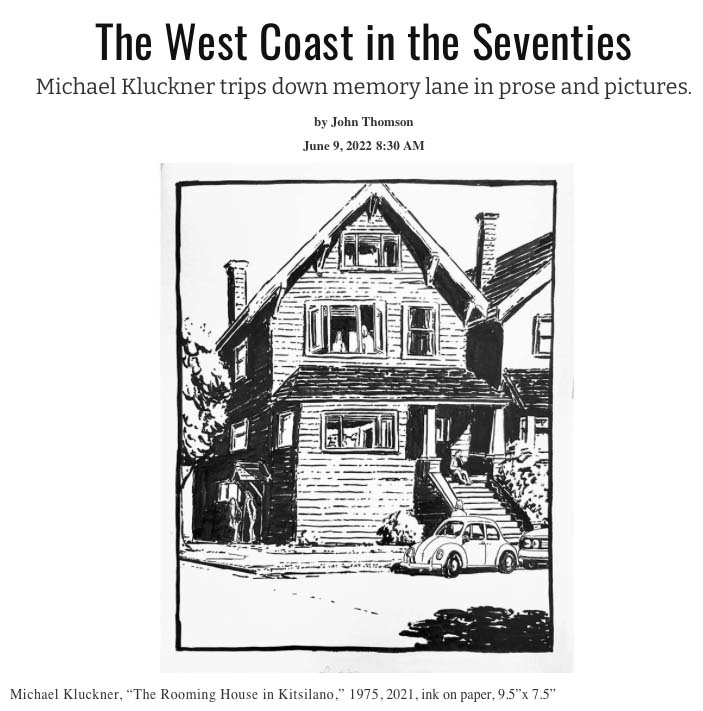
| By John Thompson Galleries West Magazine June 9, 2022 The Youngbloods, Steppenwolf, David Bowie and other boomer favourites were just the ticket to kick off the opening reception to The West Coast in the Seventies, a collection of prints and paintings from Vancouver artist and writer Michael Kluckner on view until June 16 at the Petley Jones Gallery. The opening coincided with the launch of Kluckner’s new illustrated novel, The Rooming House, an ode to hippy Vancouver as seen through the eyes of eight 20-somethings who meet at a midtown rooming house in the 1970s. The book is part fiction and part autobiography. Like his characters, Kluckner floated around Canada and California for a while, and although details differ, he says “that drifting quality just coming out of university is very much me.” In addition to writing the story, Kluckner populated it with some 130 illustrations. Alas, no bell bottoms, psychedelic posters or hash brownies were in sight at the reception, although the chocolate-chip cookies were tasty. Kluckner is showing watercolours and oil paintings, including Two Solitudes and Old Vancouver, as well as black-and-white originals, including The Rooming House in Kitsilano. Kluckner is the prolific author and illustrator of 22 books, many of them dealing with the changing urban landscape and its impact on city life. They include Vanishing Vancouver and Paving Paradise, and have won numerous prizes, such as the Bill Duthie Booksellers’ Choice Award and the City of Vancouver Book Award Kluckner studied architectural history at UBC – although his bachelor’s degree is in mathematics – and refined his childhood interest in drawing by taking studio courses. He spent his youth, he says, “trying to copy the wonderful artists” of Mad magazine. After graduation, he worked as a newspaper cartoonist at the Vancouver Sun and The Province and taught himself watercolour painting to illustrate his first book. Best known as an incessant but knowledgeable critic of rampant development, Kluckner considers himself a chronic memoirist and says The Rooming House came about while reflecting on how the issues he confronted in his youth – political action, unemployment and the environment – compare and differ from those facing youth today. They’re similar concerns, he says, but are now coloured by the growing influence of technology and materialism. Unlike his three previous graphic novels, in which the story is told in panels, The Rooming House is written in the first person as diary entries from the lead protagonists, Justin and Mary. Each page is highlighted by a stark, woodcut-like illustration, an effect Kluckner achieves with two squirrel-hair brushes broad enough to wash a large area with ink yet supple enough to come to a fine point for details. “I like the way space is defined by shadows and by how much can you leave out in a drawing,” he says of pieces like The Gastown Smoke-In. “You really need your brain to put the thing together.” The book is peppered with song titles. For instance, he suggests listening to River by Joni Mitchell or the Rolling Stones’ Tumbling Dice to set the mood. Hence, the boomer playlist at the show’s opening. Although the book tells how Justin and Mary find clarity and purpose, The Rooming House is actually a love story with a happy ending. Sort of. Kluckner welcomes interpretations. “I have the motivation to write books,” he says. “I have the motivation to paint. If I had one wish it would be that I could look at my own work through somebody else’s eyes. What is it that you’re seeing? Please tell me. I just want to know what works for other people.” ■ Michael Kluckner, The West Coast in the Seventies, at Petley Jones Gallery in Vancouver from June 2 to June 16, 2022. |
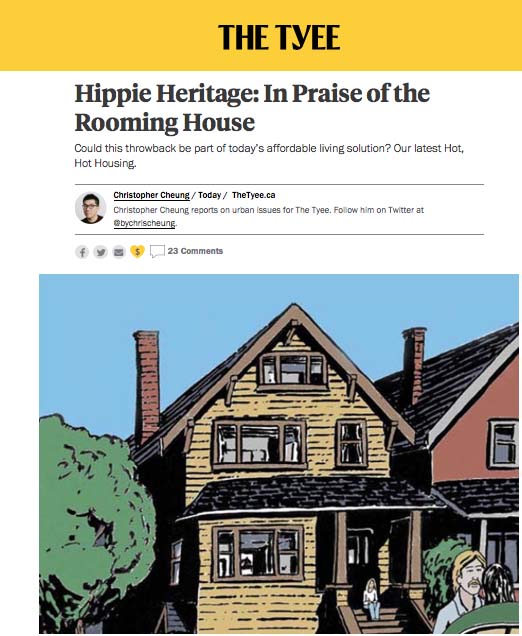
Review in The Tyee by Christopher Cheung.
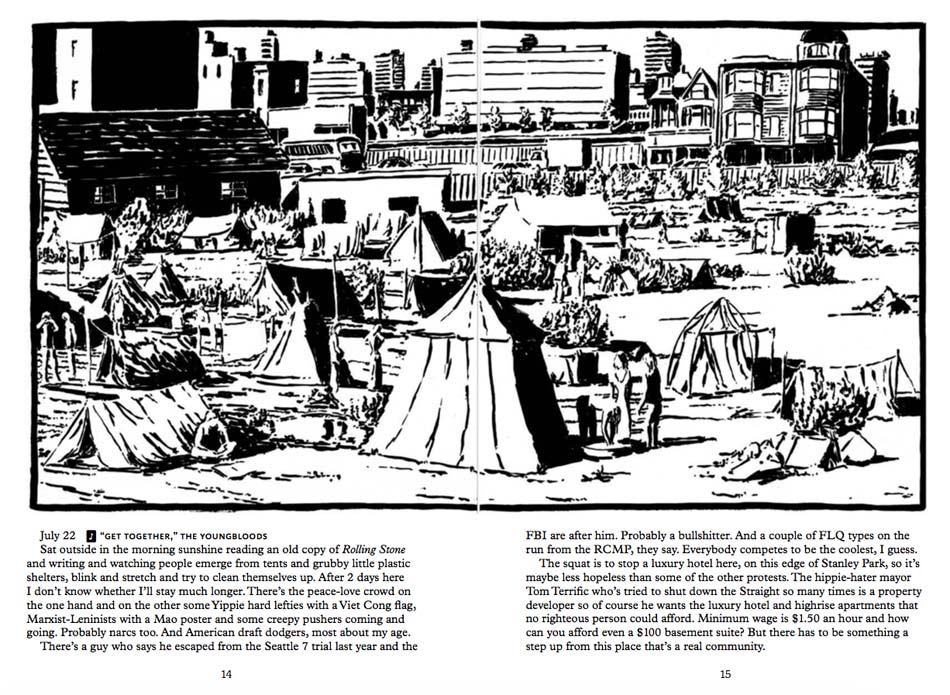
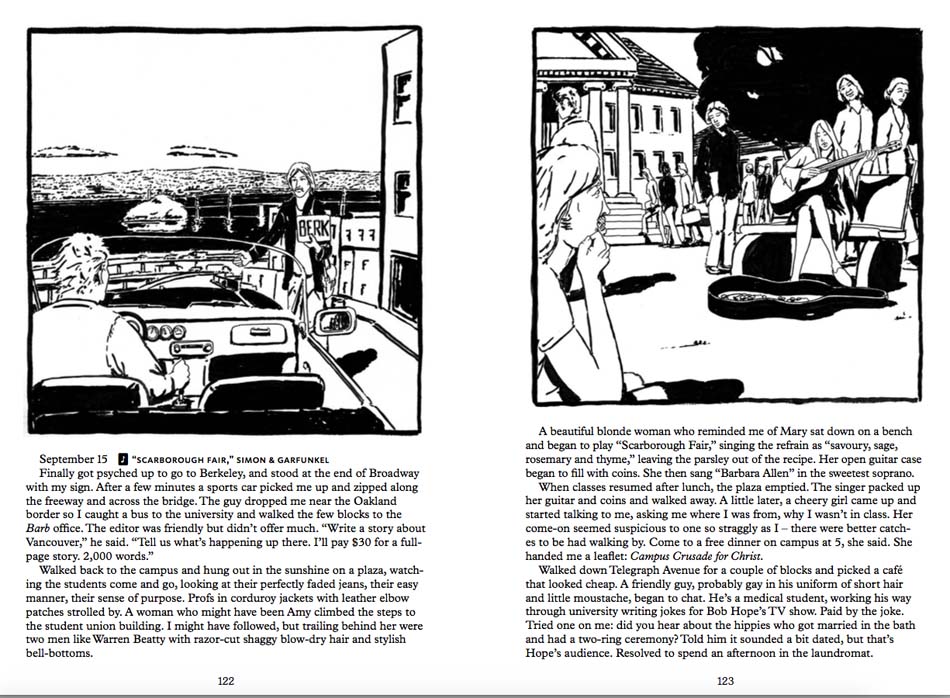
Contact me Go to home page
Artwork & text © Michael Kluckner, 2022
